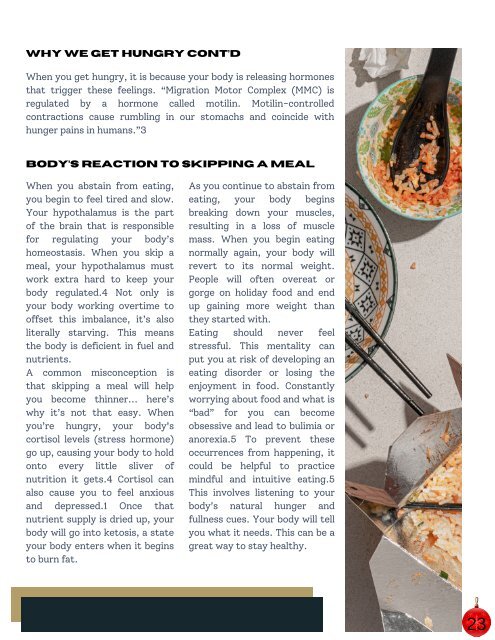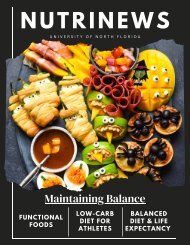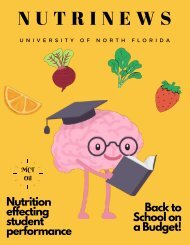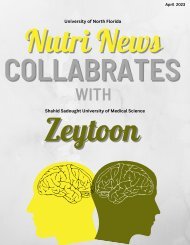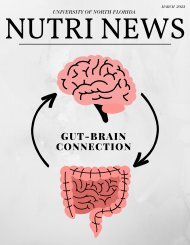December Issue 2023
Create successful ePaper yourself
Turn your PDF publications into a flip-book with our unique Google optimized e-Paper software.
WHY WE GET HUNGRY CONT’D<br />
When you get hungry, it is because your body is releasing hormones<br />
that trigger these feelings. “Migration Motor Complex (MMC) is<br />
regulated by a hormone called motilin. Motilin-controlled<br />
contractions cause rumbling in our stomachs and coincide with<br />
hunger pains in humans.”3<br />
BODY’S REACTION TO SKIPPING A MEAL<br />
When you abstain from eating,<br />
you begin to feel tired and slow.<br />
Your hypothalamus is the part<br />
of the brain that is responsible<br />
for regulating your body’s<br />
homeostasis. When you skip a<br />
meal, your hypothalamus must<br />
work extra hard to keep your<br />
body regulated.4 Not only is<br />
your body working overtime to<br />
offset this imbalance, it’s also<br />
literally starving. This means<br />
the body is deficient in fuel and<br />
nutrients.<br />
A common misconception is<br />
that skipping a meal will help<br />
you become thinner... here’s<br />
why it’s not that easy. When<br />
you’re hungry, your body's<br />
cortisol levels (stress hormone)<br />
go up, causing your body to hold<br />
onto every little sliver of<br />
nutrition it gets.4 Cortisol can<br />
also cause you to feel anxious<br />
and depressed.1 Once that<br />
nutrient supply is dried up, your<br />
body will go into ketosis, a state<br />
your body enters when it begins<br />
to burn fat.<br />
As you continue to abstain from<br />
eating, your body begins<br />
breaking down your muscles,<br />
resulting in a loss of muscle<br />
mass. When you begin eating<br />
normally again, your body will<br />
revert to its normal weight.<br />
People will often overeat or<br />
gorge on holiday food and end<br />
up gaining more weight than<br />
they started with.<br />
Eating should never feel<br />
stressful. This mentality can<br />
put you at risk of developing an<br />
eating disorder or losing the<br />
enjoyment in food. Constantly<br />
worrying about food and what is<br />
“bad” for you can become<br />
obsessive and lead to bulimia or<br />
anorexia.5 To prevent these<br />
occurrences from happening, it<br />
could be helpful to practice<br />
mindful and intuitive eating.5<br />
This involves listening to your<br />
body’s natural hunger and<br />
fullness cues. Your body will tell<br />
you what it needs. This can be a<br />
great way to stay healthy.<br />
23


